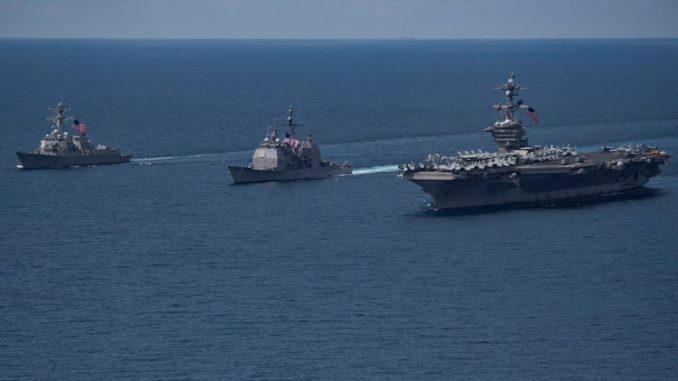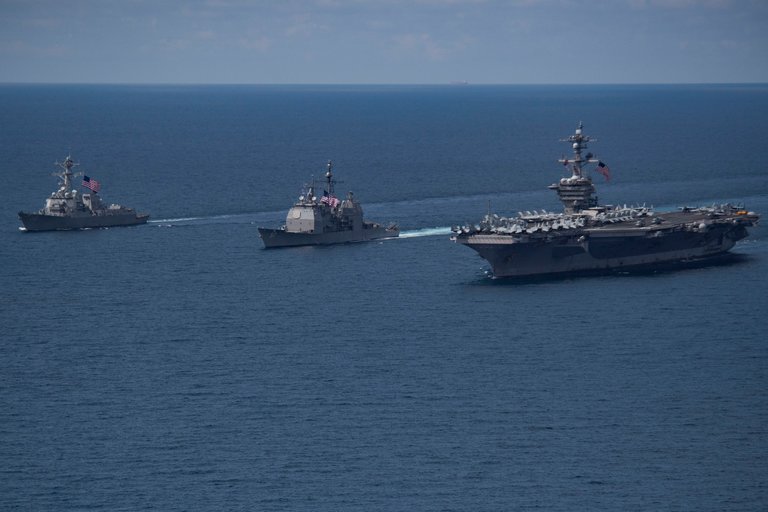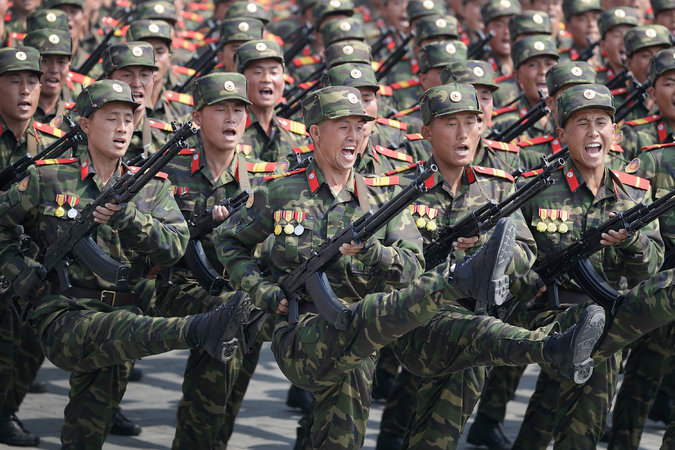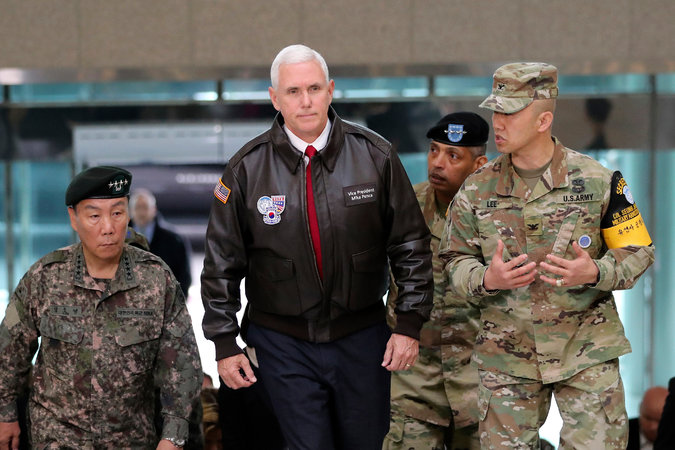
South Koreans feel bewildered, cheated & manipulated by US, their country’s most important ally. Episode raises questions about whether major US allies, like South Korea and Japan, had been informed of carrier’s whereabouts, & if, by using empty threats, misinformation undercuts US strategy to contain the North. Compounding their anger over Vinson fiasco, South Koreans were also riled at Trump for ignorant assertion last week that Korean Peninsula “used to be a part of China.” This is what happens when an American President gets his “tutorial” on East Asian history FROM THE PRESIDENT OF CHINA !!! All major candidates for South Korean presidential election warned a pre-emptive US strike would set off full-scale war. Here, aircraft carrier Carl Vinson, right, in the Indian Ocean last week. Credit U.S. Department of Defense
When news broke less than two weeks ago that the Trump administration was sending the aircraft carrier Carl Vinson to the Korean Peninsula,
many South Koreans feared a possible war with North Korea.
Others cheered for Washington, calling the deployment a powerful symbol of its commitment to deterring the North.
On Wednesday, after it was revealed that the carrier strike group was actually thousands of miles away
and had been heading in the opposite direction, toward the Indian Ocean,
South Koreans felt bewildered, cheated and manipulated by the US, their country’s most important ally.
“Trump’s Lie Over the Carl Vinson,” read a headline on the website of the newspaper JoongAng Ilbo on Wednesday.
“Xi Jinping and Putin must have had a good jeer over this one.”
“Like North Korea, which is often accused of displaying fake missiles during military parades,
is the US, too, now employing ‘bluffing’ as its North Korea policy?” the article asked.
The episode raised questions about whether major allies of the United States, like South Korea and Japan, had been informed of the carrier’s whereabouts,
and whether the misinformation undercut America’s strategy to contain North Korea’s nuclear ambitions by using empty threats.
Compounding their anger over the Carl Vinson episode, many South Koreans also were riled at Trump
for his assertion in a Wall Street Journal interview last week that the Korean Peninsula “used to be a part of China.”
[ This is what happens when an ignorant American President gets his “tutorial” on East Asian history FROM THE PRESIDENT OF CHINA !!! ]
Although Korea was often invaded by China and forced to pay tributes to its giant neighbor,
many Koreans say the notion that they were once Chinese subjects is egregiously insulting.
“The 50 million South Koreans, as well as many common-sensical people around the world, cannot help but feel embarrassed and shocked,”
said Youn Kwan-suk, spokesman of the main opposition Democratic Party,
which is leading in voter surveys ahead of the May 9 presidential election.
[ Insanely stupid remark will ALSO infuriate racist NORTH Koreans, making them even LESS willing to heed Chinese warnings. ]
More on Vinson Scandal
American aircraft carriers regularly visit areas near the Korean Peninsula as part of annual military exercises with South Korea and Japan.
But when the US Navy Pacific Command said on April 9 that the Carl Vinson had been ordered to leave Singapore and return to the Western Pacific,
the decision was considered highly unusual, as it had been in exercises off the Korean Peninsula just last month.
“We’re sending an armada,” Trump snorted at the time.
On Wednesday, the South Korean Defense Ministry declined to comment,
other than to say that the US and South Korea do not discuss the details of their joint strategy to deter North Korean provocations.
North Korean soldiers took part in a parade on Saturday to honor the 105th anniversary of the birth of the country’s founder. Credit Wong Maye-E/Associated Press
But critics accused the ministry of fanning jitters among South Koreans before a May 9 presidential election
in which North Korea’s behavior has been a central issue — as have Seoul’s close military ties to Washington.
“There is no way for South Korea not to have known that the Carl Vinson would not be in Korean waters last Saturday,”
said Kim Dong-yub, a former navy officer and defense analyst at the Institute for Far Eastern Studies at Kyungnam University in Seoul.
“Still, they kept mum, doing nothing to ease the anxiety when security was a key election issue.”
Kim added: “What they did was nothing short of trying to influence the election.
The whole episode is a reminder of how fettered South Korea remains to its alliance with the United States.”
Shin In-kyun, a military expert who runs the civic group Korea Defense Network, said that
Trump appeared to have used the Carl Vinson as a feint aimed at preventing North Korea from conducting a nuclear test.
“It would have been very awkward for the South Korean military to come out and clarify when they knew that Trump was bluffing,” Shin said.
“The bluffing worked, in fact. North Korea didn’t do a nuclear test last Saturday.”
Coupled with Trump’s order to strike a Syrian air base with dozens of missiles,
and repeated warnings from his senior aides that “military options” were not off the table in dealing with North Korea,
news of the Carl Vinson rushing back to Korean waters stirred anxiety in South Korea.
The fear was that if North Korea were to conduct a nuclear or long-range missile test on Saturday
to commemorate the 105th anniversary of the birth of Kim Il-sung, the North’s founding president and the grandfather of Kim Jong-un,
the Carl Vinson would be in Korean waters by then to launch a pre-emptive strike.
North Korea, never one to be outdone in tough talk, accused the US of bringing war to Korea
and vowed to respond with nuclear attacks at American military bases in South Korea and Japan.
This week, it unveiled a video depicting its missiles engulfing an American city in flames, shown as a backdrop for the Kim Il-sung celebration.
In South Korea, all major candidates for the presidential election issued statements warning
that a pre-emptive American strike would set off a full-scale war on the Korean Peninsula.
They intensified their bickering over who was best suited to keep the peace on the peninsula.
Vice President Mike Pence in the demilitarized zone that separates North and South Korea on Monday.
Kim Ky-baek, who runs the nationalist South Korean website Minjokcorea, expressed fears that
the Carl Vinson episode would damage Trump’s credibility among South Koreans.
“Trump may say this was part of his smoke-screen tactic,” he said.
“But the impression we get is that the Trump administration still doesn’t know what it is really trying to do with North Korea,
and has no clear and efficient line of communication.”
When the chief cabinet secretary Yoshihide Suga, the Japanese government spokesman, was asked about the issue at his daily news briefing on Wednesday,
he declined to address the misreported itinerary directly.
“It’s an operational matter for the United States military,” he said.
But Hideshi Takesada, a professor at the Institute of World Studies at Takushoku University in Japan, said
it was inconceivable the Japanese military was unaware of plans for the Carl Vinson’s deployment.
“When it comes to matters that concern Japan, the two militaries communicate essentially in real time,” he said.
By allowing misconceptions about the strike group’s location to persist, he added,
the Trump administration had ratcheted up pressure on North Korea.
Officials in Tokyo effectively cooperated by not speaking out.
“Whatever the case, whether it was deliberate misinformation
or a miscommunication between the Pentagon and the White House, it’s quite serious,”
said Narushige Michishita, a specialist in international security at the National Graduate Institute for Policy Studies in Tokyo.
“It undermines the credibility of U.S. leadership.”
The Carl Vinson is now actually headed to the Korean Peninsula and is expected to arrive in the region next week, Pentagon officials say.
April 25 is another major anniversary in North Korea, the birthday of the Korean People’s Army,
and some analysts say the North might try to celebrate with a major provocation.
In a Facebook post on Wednesday, Rear Adm. James W. Kilby, commander of the Carl Vinson carrier strike group,
said its deployment “has been extended 30 days to provide a persistent presence in the waters off the Korean Peninsula.”
Source: South Koreans Feeling Cheated After U.S. Carrier Miscue – The New York Times


